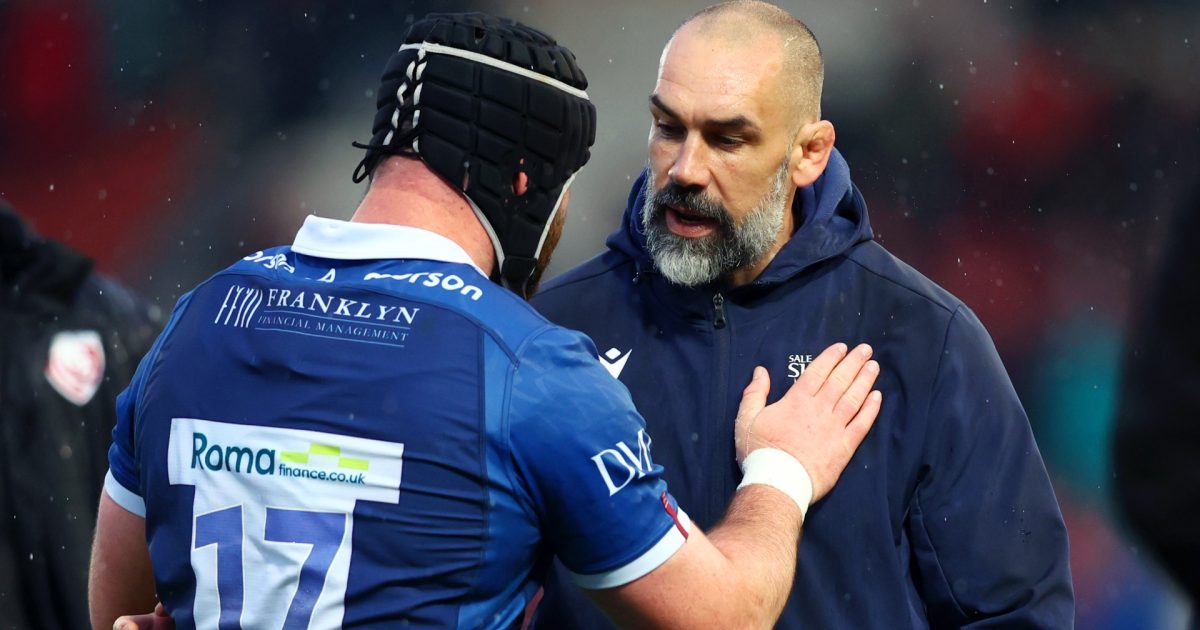Sale boss Sanderson has reacted to Northern super club merger idea

Sale boss Alex Sanderson has responded to a recent radical suggestion that the Sharks should merge with Newcastle and one other club in the region to create a new Gallagher Premiership team called The North.
Mick Hogan spent more than 14 years working with the Falcons in a variety of roles, while he was also the Sale CEO for a two-year period from 2010. He no longer works in the Premiership, but he isn’t shy about giving an opinion.
Hogan’s latest idea – published in last Sunday’s Rugby Paper ahead of this Saturday’s Sale versus Newcastle league fixture – was the creation of a super club that would pool resources and consolidate the rugby union audience in the north of England. Newcastle quickly clarified that this was a personal piece, not something on the table.
Sale boss Sanderson has now given his reaction to the super club idea. “Definitely,” he chuckled in response to a query from RugbyPass. “As long as they call it Sale Sharks I’m not bothered.”
In all seriousness, though, while the Premiership title-chasing Sanderson doesn’t entertain the idea of a northern club merger, he welcomes anything that ignites a conversation about rugby in the north and believes that the RFU should be doing more to assist the growth of the sport in the region.
“Definitely, it’s rugby in the north and Newcastle are part of that. At the moment we are flying the flag for the women’s game because we really think it is important. It’s a massive expense when there is a constant debate, and correspondence with the RFU that we should be helped and supported because there are fewer incentives financially for investors to invest in it.
“But if the RFU is serious about it being a nationwide sport then to some degree help us to subsidise it and the same with Newcastle. The game isn’t feasible. There is less money up north, so how can we keep creating interest from a grassroots level right up to the Premiership in both men’s and women’s so it thrives and it is not just in little pockets? Any conversations we have around that are important.”
In the past, areas such as Leeds were important drivers of player development but their demise down the grassroots pyramid continued with relegation to the fourth tier of the men’s game. It’s an indication of the reduced window that local youngsters now have to prosper but Sale are willing to do their part, revealing that they have signed two England U18 internationals from the Yorkshire academy to help accelerate their progress.
“There is no pathway for those young lads,” continued Sanderson. “There are still good players. We have signed two for next year, Tom Burrow and Tye Raymont. These are good players and a lot of clubs were after them but at least we have got an affiliation in the north, we are close to the support base.
“They came down, we told them what we are about and they have come to us which I am really grateful for, but there is no aligned pathway there for them to get through to the top level. There is in Newcastle but there probably needs to be someone in the middle as well.
“I feel like if we don’t do something now then it could die, it really could die from a playing perspective, from reaching a new generation of support as well. That is really important.”
While the overall picture in the northern region has its long-term concerns, Sale are currently on the up as their upcoming Premiership semi-final on May 14 quickly sold out, creating a supply and demand issue that could entice the club to in future seek out a larger capacity ground than the 10,000 capacity AJ Bell for one-off fixtures.
“There has been chat in the past about exhibition games and getting a bigger stadium, but it just hasn’t seemed feasible at present,” explained Sanderson.
“I have asked the question and there is a desire and a want to do that but if you want to change the world you have to start in your own backyard. That is what we have started, making our place [the AJ Bell] a bit of a fortress and if they want to come, then we can look at the bigger picture.
“The first priority has been to create supply and demand, demand for supply at the AJ Bell, and the semi-final will be the fifth game that will be sold out, so we are doing that [making progress]. The Newcastle game is sold out as well. That is a credit to the commercial team; they are cracking on and doing well.”




























